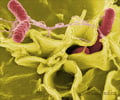Cannibalistic process in cells plays a key role in preventing Salmonella infection, according to infectious-disease specialists at UT Southwestern Medical Center.
Cannibalistic process in cells plays a key role in preventing Salmonella infection, according to infectious-disease specialists at UT Southwestern Medical Center.
Salmonella, the causative agent of salmonellosis, causes many of the intestinal infections and food-related illnesses.The new findings are among the first to demonstrate that a process called autophagy (pronounced "aw-TAH-fah-gee") prevents harmful bacteria, such as Salmonella, from becoming successful pathogens.
In addition, the findings suggested that decreases in autophagy - such as those that occur in the elderly and in certain patients with Crohn's disease, an inflammatory bowel disorder - might lead to abnormalities in the way the intestinal tract deals with bacterial infections.
"It's known that as you get older you become more susceptible to infectious diseases and also that autophagy decreases. In this paper, we've shown that signaling pathways that extend life and protect against bacterial invaders do so by triggering autophagy. This suggests that therapeutic strategies to increase autophagy may be effective in defeating harmful bacteria that can enter inside cells," said Dr. Beth Levine, senior author of the new study.
Autophagy is the way cells devour their own unwanted or damaged parts. It is a highly regulated and completely normal process by which cells remain healthy by performing "routine housekeeping" and "garbage disposal."
Previous studies have shown that the process appears to be an adaptive response that our bodies employ during times of stress or starvation, and which also helps protect our bodies against cancer and neurodegenerative diseases.
Advertisement
Levine has said that it is possible that by reversing or regulating this process, researchers could prevent the elderly and others with weakened immune systems from becoming more susceptible to infections.
Advertisement
In both cases, the animals with inactive autophagy genes fared far worse than those with active ones.
Instead of being targeted for elimination, the Salmonella bacterium was able to invade the host cells, where it started replicating.
Levine said that the findings indicate that the autophagy process plays an important role in resistance to certain types of pathogens, specifically those that can enter inside our cells.
The next step, Dr. Levine said, is to begin studying the efficacy of a new autophagy-inducing molecule in treating a number of intracellular bacterial infections including salmonellosis, tuberculosis, tularemia and listeriosis.
The study has been published in an upcoming issue of the Proceedings of the National Academy of Sciences.
Source-ANI
LIN










